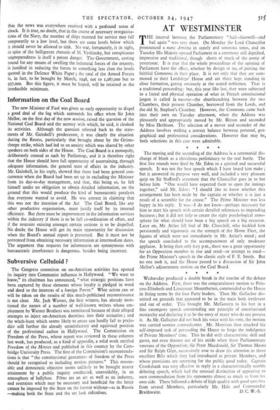Information on the Coal Board
The new Minister of Fuel was given an early opportunity to dispel a good deal of the fog which surrounds his office when Sir John Mellor, on the first day of the new session, raised the question of the National Coal Board and the secrecy with which, he said, it cloaked its activities. Although the question referred back to the state- ments of Mr. Gaitskell's predecessor, it was clearly the situation during the Recess, particularly that brought about by the Grime- thorpe strike, which had led to an anxiety which was shared by other speakers on both sides of the House. The Coal Board is a monopoly, deliberately created as such by Parliament, and it is therefore right that the House should have full opportunity of ascertaining, through adequate information, the general state of affairs in the industry. Mr. Gaitskell, in his reply, showed that there had been general con- currence when the Board had been set up in excluding the Minister from its day-to-day management, and that, this being so, he felt himself under no obligation to obtain detailed information, on the ground that this would produce the kind of bureaucratic paralysis that everyone wanted to avoid. He was correct in claiming that this was not the intention of the Act. The Coal Board, like any other productive organisation, must justify itself by its internal efficiency. But there must be improvement in the information services within the industry if there is to be full co-ordination of effort, and if the restraint existing amongst certain sections is to be dispelled. No doubt the House will- get its main opportunity for discussion when the Board's annual report is presented. But it must not be prevented from obtaining necessary information at intermediate dates. The argument that requests for information are synonymous with bureaucratic interference is dangerous, besides being incorrect.
































 Previous page
Previous page